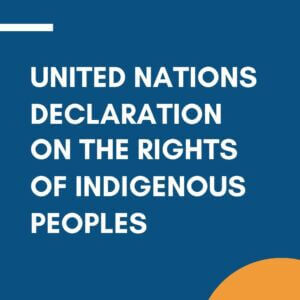By Gabriel Louër

In 2007, the United Nations adopted the Declaration on the Rights of Indigenous Peoples (UNDRIP) a global framework for protecting and promoting Indigenous peoples' rights worldwide. The resolution, which took nearly two decades of negotiations before its formalization, is comprised of 46 articles covering a wide range of subjects. Among these include stipulations on the right to self-determination, economic freedom, cultural preservation, and participation in decision-making processes affecting Indigenous communities.
At its core, UNDRIP emphasizes the importance of self-determination for Indigenous communities, particularly in relation to development projects, resource extraction and self-governance. The principles laid out in UNDRIP are not just aspirational but reflect the global recognition of Indigenous peoples’ inherent rights to autonomy.
In the Canadian context, the adoption of UNDRIP is of particular significance. Canada formally endorsed the Declaration in 2016, followed by the groundbreaking passage of the United Nations Declaration on the Rights of Indigenous Peoples Act (UNDRIP Act) in 2021. This legislation mandates that Canadian laws align with UNDRIP’s principles, creating a legal pathway to honour Indigenous rights.
UNDRIP's Role in Indigenous Business Development
This legislative commitment is a crucial step toward recognizing and addressing the historical injustices faced by Indigenous peoples in Canada, including colonialism, dispossession, and systemic discrimination.
A central aspect of UNDRIP is its potential to drive economic reconciliation, addressing long-standing disparities between Indigenous and non-Indigenous communities. Economic reconciliation involves addressing the economic disparities between Indigenous and non-Indigenous communities and creating opportunities for Indigenous peoples to thrive in a manner that respects their culture, rights, and traditional knowledge.
Provisions on land rights and self-determination are foundational, offering Indigenous communities the tools to reclaim control over their natural resources, steward their lands sustainably, and advance culturally aligned economic initiatives.
For Indigenous entrepreneurs, UNDRIP guarantees a seat at the table in economic decisions affecting their lands and communities—extending from resource development to education and renewable energy projects. This includes not only resource extraction but also broader economic development initiatives, such as renewable energy projects, infrastructure, and education programs, all of which can create long-term opportunities for Indigenous peoples.
Implementing UNDRIP: Challenges and Opportunities
The future of UNDRIP in Canada, particularly in the context of economic reconciliation, will depend on the continued political will to implement its principles effectively. Despite progress, significant challenges persist, particularly in ensuring Indigenous communities gain meaningful control over land development and resource use—essential steps for true reconciliation.
As more Indigenous communities assert their rights and engage in economic development activities, the principles of UNDRIP will play a pivotal role in shaping a more equitable and sustainable future for all Canadians. The path forward lies in meaningful collaboration, respect for Indigenous governance systems, and a commitment to addressing the economic inequities that continue to affect Indigenous communities across Canada.
Ready to turn UNDRIP knowledge into action? Join our "Understanding Indigenous Rights and Responsibilities" training on February 6 – the first session in our comprehensive four-part series. This focused workshop will equip you with practical strategies to navigate Indigenous partnerships and business opportunities. Learn more about our training series.
Join Our Newsletter
As Manitoba's voice for Indigenous business and your partner in economic reconciliation, we connect you to opportunities that drive change. Subscribe to receive updates on Indigenous business developments, partnership opportunities, and upcoming events delivered straight to your inbox.



